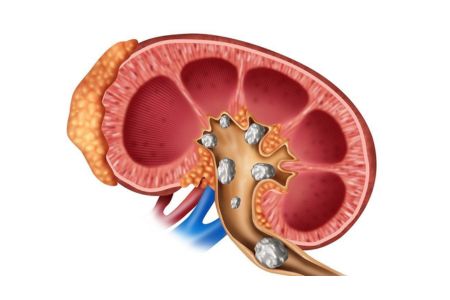Kidney Stones Causes, Symptoms, and Treatment
Kidney stones are hard deposits made of minerals and salts that form inside your kidneys. They can affect any part of your urinary tract, from the kidneys to the bladder. Passing kidney stones can be extremely painful, but they usually cause no permanent damage if treated early. If you suspect you have kidney stones or are experiencing symptoms, consult a urologist like Dr. Abdul Rauf for expert care.

What Are Kidney Stones?
Kidney stones are solid crystals that form when certain substances in the urine, such as calcium, oxalate, and uric acid, become highly concentrated. These crystals can grow into larger stones over time. Kidney stones vary in size—some are as small as a grain of sand, while others can grow as large as a golf ball.
Causes of Kidney Stones
Kidney stones develop due to a combination of factors, including diet, lifestyle, and medical conditions. Common causes include:
- Dehydration: Not drinking enough water leads to concentrated urine, which increases the risk of stone formation.
- Diet: Eating foods high in salt, sugar, or oxalates (like spinach, nuts, and chocolate) can contribute to kidney stones.
- Family History: A family history of kidney stones increases your risk.
- Medical Conditions: Conditions like obesity, urinary tract infections (UTIs), and digestive diseases can increase the likelihood of stones.
- Medications: Certain medications, such as diuretics or calcium-based antacids, can raise the risk of stone formation.
Symptoms of Kidney Stones
Kidney stones often cause no symptoms until they move within the kidney or pass into the ureter (the tube connecting the kidney and bladder). Common symptoms include:
- Severe pain in the side, back, or lower abdomen
- Pain during urination
- Blood in the urine (hematuria)
- Nausea and vomiting
- Frequent urge to urinate
- Cloudy or foul-smelling urine
If you experience any of these symptoms, seek medical attention immediately.
Diagnosis of Kidney Stones
To diagnose kidney stones, Dr. Abdul Rauf may perform the following tests:
- Physical Examination: Checking for tenderness or pain in the abdomen or back.
- Urine Test: Analyzing a urine sample for signs of infection, blood, or crystals.
- Blood Test: Checking for high levels of stone-forming substances like calcium or uric acid.
- Imaging Tests: Using X-rays, ultrasounds, or CT scans to locate the stones and determine their size.
Treatment Options for Kidney Stones
The treatment for kidney stones depends on their size, location, and the severity of symptoms. Common treatment options include:
- Drinking Plenty of Water: Small stones may pass naturally with increased fluid intake.
- Medications: Pain relievers and medications to relax the ureter can help pass stones more comfortably.
- Extracorporeal Shock Wave Lithotripsy (ESWL): Using sound waves to break large stones into smaller pieces that can pass more easily.
- Ureteroscopy: A thin tube with a camera is inserted into the ureter to remove or break up the stone.
- Surgery: In rare cases, large stones may require surgical removal.
Preventing Kidney Stones
Prevention is key to avoiding kidney stones. Here are some tips to reduce your risk:
- Stay Hydrated: Drink plenty of water throughout the day to keep your urine diluted.
- Eat a Balanced Diet: Limit foods high in salt, sugar, and oxalates. Include calcium-rich foods in moderation.
- Maintain a Healthy Weight: Obesity increases the risk of kidney stones.
- Limit Animal Protein: Reduce intake of red meat, poultry, and eggs, which can increase uric acid levels.
- Monitor Medications: Consult your doctor if you’re taking medications that may increase stone risk.
Why Choose Dr. Abdul Rauf for Kidney Stone Treatment?
Dr. Abdul Rauf is a highly skilled urologist with extensive experience in diagnosing and treating kidney stones. He uses the latest technology and minimally invasive techniques to provide effective and personalized care. Whether you’re experiencing symptoms or need preventive advice, Dr. Abdul Rauf is here to help.
📧 Email: info@drabdulrauf.com
🌐 Website: www.drabdulrauf.com
📍 Address: IMC Hospital DHA Lahore
📞 Phone: 0336 8609825
Don’t let kidney stones disrupt your life. Contact Dr. Abdul Rauf today for expert care and treatment options.
